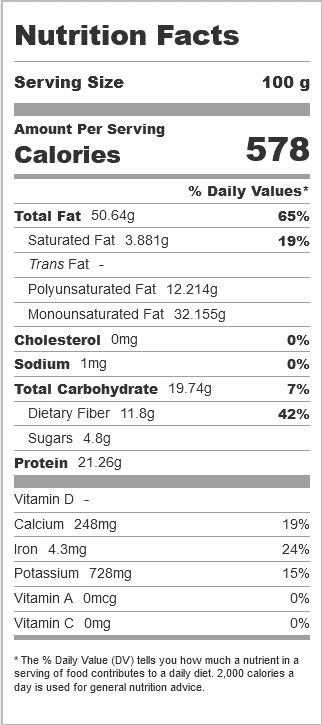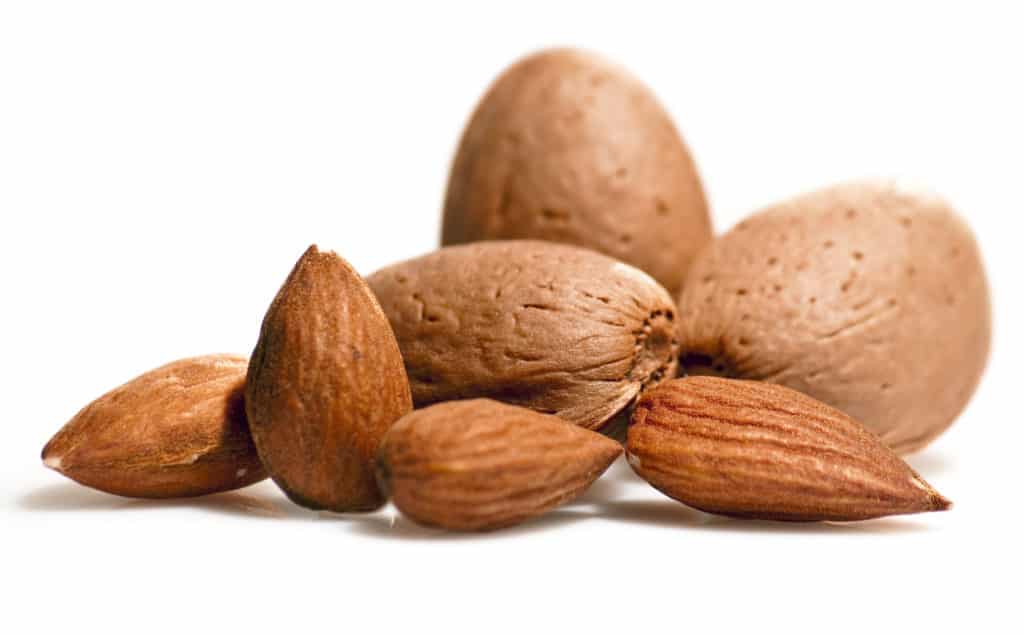Almonds are tasty, cheap, and above all, highly nutritious. Moreover, they are highly beneficial. So, no wonder people around the world love it. But while humans love to eat almonds, what about pets, especially hamsters? Can hamsters eat almonds? Are almonds safe for hamsters to eat? Or, can they create health issues? If hamsters can eat almonds, what should you watch out for? Read this blog post and find out.
Almonds
But before we go on and find out if hamsters can eat almonds, let’s look at what almonds are and where they came from.
Contrary to popular opinion, almond is not a nut; it is the seed of the fruit of the almond tree. Like cherries, plums, etc., the seed resides within a fleshy fruit. Nuts, on the other hand, have a hard outer shell, like chestnuts (Source: Live Eat Learn).
There are more than 30 varieties of almonds (Source: Almonds).
Origin
Almond is one of the earliest domesticated fruit trees. It originated in western Asia, somewhere near Iran and its surrounding countries. Almonds appear in the early Bronze age archaeological sites in Jordan, dating between 3,000BC and 2,000BC.
From there, early humans traversing along the Mediterranean sea brought it to northern Africa and southern Europe. So, centuries later, almonds appear in Tutankhamun’s tomb in Egypt, dating back to 1325 BC (Source: Wikipedia).
Eventually, it spread to other parts of the world, like the Americas. Today, the USA is the world’s largest producer of almonds.
Nutritional content in almonds
Almonds are a healthy snack for your hamster. They contain many vital nutrients. The nutritional content in 100g of almonds is listed below:

(Source: Fat Secret)
Can hamsters have almonds? Are almonds safe for hamsters?
Almonds can be a healthy snack for your hamster when fed in moderation.

Health benefits
1. Free radicals are harmful substances produced in the bodies of oxygen-consuming organisms. These organisms get their energy through cellular respiration (Source: Max-Planck-Institute). During this process, carbohydrates and oxygen are broken down into carbon dioxide and water. But at the same time, harmful toxic substances called free radicals are also created. These free radicals are volatile molecules, which need electrons to become stable. They steal these electrons from the cells, membranes, and DNA in the bodies of these organisms. This process, called oxidation, can bring catastrophic damage to the organism and even cause cancer.
Antioxidants prevent free radicals from damaging the body by providing them the electrons they seek and neutralizing them. So, antioxidants are important substances that most living organisms, including your hamster, need.
Almonds are a very good source of phenolic compounds, which act as powerful antioxidants (Source: PubMed). These compounds possess antimicrobial, anti-inflammatory, anti-mutagenic, and anticancer properties (Source: PubMed). But these beneficial substances are concentrated in the brown skin of almonds.
2. Almonds are one of the best sources of vitamin E in the world (Source: Healthline). Vitamin E acts as a fat-soluble antioxidant that builds up inside the cell membranes and protects the body cells from oxidative damage. By doing so, it might reduce the risk of cancer and heart diseases (Source: Healthline).
3. 100g of Almonds contains almost 50g of fats. So, you may be forced to think that almonds are bad for your hamster. But that’s not the case. Because more than 90% of the fat in almonds belongs to the healthy type – unsaturated fats. These fats reduce the level of bad cholesterol in the body and increase the level of good cholesterol (Source: Harvard). Thus, they can protect your hamster from various heart diseases. Moreover, replacing the carbohydrates in your hamster’s diet with unsaturated fats would reduce his blood pressure and improve his cardiovascular system.
Less than 10% of the fats in almonds are saturated fats. Even though saturated fats may not be directly linked to heart diseases, they are not as healthy as saturated fats. Almonds contain almost zero Trans fats – the worst kind of fats to consume – and zero cholesterol. So, almonds are a healthy treat for your hamster.
4. Almonds contain almost 140% more fiber than sugars. Almonds are also a rich source of proteins too. The fiber, proteins, and unsaturated fats in almonds can increase your hamster’s feelings of fullness, making him eat fewer calories. Thus, almonds can regulate blood sugar levels and protect your hamster from obesity and diabetes. They can also help your hamster reduce weight if he is already obese.
5. Almonds also contain sufficient amounts of important minerals. Almonds contain potassium, which widens blood vessels, thereby reducing blood pressure (Source: Live Science). They also contain magnesium and calcium, which further reduce blood pressure and prevent heart diseases (Source: PubMed).
Risks
1. There are two wide varieties of almonds: sweet and bitter. Both varieties contain a toxin called glycoside amygdalin. This toxin breaks down into a chemical called Hydrogen Cyanide upon eating, which could cause death. The amount of glycoside amygdalin in bitter almonds is almost a thousand times more than that of sweet almonds (Source: Healthline). Eating more than a handful of bitter almonds could cause breathing issues, nervous breakdown, choking, and death even in a human adult. So, you should never give bitter almonds to your hamster. Sweet almonds, on the other hand, are safe for hamsters.
2. Almonds are rich in oxalates, which could cause kidney stones and renal failure. So, don’t give too many almonds to your hamster.
3. Almonds are rich in vitamin E. Though it is not possible for humans to overdose on vitamin E just by eating too many almonds, the same cannot be said about hamsters, which are smaller in size. So, if your hamster eats too many almonds, he might overdose on vitamin E. This could prevent blood coagulation and lead to excessive bleeding.
4. 100g of almonds contain 578 calories. So, if your hamster doesn’t run around and play that much, he can gain weight quickly if he eats too many almonds.
5. Almonds contain high amounts of fiber. So, eating too many of them could cause bloating, gas, constipation, or diarrhea (Source: Duke University). This is particularly true if your hamster doesn’t drink much water.
6. Too much fiber can also bind with minerals like calcium, magnesium, and iron and reduce the body’s ability to absorb them (Source: Style Craze).
Different breeds of hamsters vs. almonds
There are different types of hamsters. So, even though hamsters can eat (sweet) almonds, the amount your hamster can eat depends on his breed.
Can Chinese dwarf hamsters eat almonds?
Yes, Chinese hamsters can eat almonds. But Chinese dwarf hamsters are smaller compared to Roborovski hamsters and Syrian hamsters. So, they cannot eat the same quantity of food as these bigger hamsters. They can eat one-fourth of an almond a day at most. But almonds could cause choking. So, carefully observe your hamster until he finishes eating the almond to make sure he doesn’t end up choking.
Can Campbell dwarf hamsters eat almonds?
Yes, but just like Chinese dwarf hamsters, Campbell hamsters are small creatures too. So, you can give them one-fourth of an almond on any given day. But keep a watch on your hamster while he eats the almond to make sure he doesn’t end up choking.
Can Russian dwarf hamsters eat almonds?
Yes, Winter White hamsters (also known as Russian dwarf hamsters) can eat almonds. But they cannot eat more than one-fourth of an almond per day. And supervise your hamster while he eats the almond to make sure he doesn’t choke on the almond.
Can Roborovski hamsters eat almonds?
Yes, they can. Roborovski hamsters are smaller than other dwarf hamsters. But they are also more active than other dwarf hamsters. So, they can eat a higher quantity of food when compared to dwarf hamsters. This applies to almonds as well. They can eat half an almond per day (Source: Just hamsters). But you need to supervise your hamster while he eats the almond. If not, your hamster could end up choking on the almond, and you wouldn’t even know about it.
Can Syrian hamsters eat almonds?
Yes, they can. Syrian hamsters are the largest hamster breed. So, they can eat more almonds than other breeds – almost an almond every day. But your hamster should not eat almonds unsupervised because they can cause choking.
Frequently Asked Questions
Can hamsters eat bitter almonds?
No. Like we discussed before, bitter almonds can kill your hamster. So, never give bitter almonds to your hamster.
Can hamsters eat salted almonds?
No. While salted almonds can be a great snack for you, it is not the case with hamsters. Excess salt can cause dehydration in hamsters. So, you should not give salted almonds to hamsters.
Can hamsters eat flavored almonds?
Flavored (other than salted) almonds are not necessarily dangerous for your hamster. But flavored almonds can contain additives like sugar and sodium, both of which are dangerous for your hamster. So, if you want to feed almonds to your hamster, the raw ones are the best choice.
Can hamsters eat almond skins?
As discussed before, the antioxidants in almonds are concentrated in their brown skins. So, you can eat almonds along with their brown skins. But for little hamsters, unfortunately, these brown skins can cause stomach irritation (Source: Hutch and Cage). So, soak the almond in hot water for 15 minutes so that it becomes easy to peel the skin off. Then, gently rub the almond to remove its skin before giving it to your hamster.
Can hamsters eat almond shells?
Shells are not dangerous to hamsters. But almond shells can contain harmful chemicals like pesticides. So, even though almond shells can be a great treat for hamsters because hamsters can gnaw on the shells to break them and take the almond out, it is better to remove the shells before giving almonds to your hamster. Moreover, shells can cause choking as well. So, buy almonds without shells if possible.
Should I buy organic almonds for my hamster?
Almonds, just like many other food products, may contain chemicals like pesticides sprayed onto them. But organic almonds do not contain such harmful chemicals. Moreover, these chemicals are mostly concentrated on the shells of almonds. So, organic almonds without shells are a better choice for your hamster.
What happens if my hamster eats too many almonds?
Almonds can act as a healthy treat for your hamster. It has good amounts of saturated fats that are highly beneficial. But when fed too often, the fat can make your hamster obese. But that’s not all. Providing too many almonds too often to your hamster could cause malnutrition. Almonds do not contain all the nutrients your hamster needs. Hence, they should not be used as a staple food for hamsters.
The high-quality pellets or mixed foods available in the market are specially made so that they can meet the nutritional requirement of hamsters. So, they should make most of the diet of your hamster. You can also give fruits, vegetables, and nuts like almonds in small quantities every day. This way, your hamster can have a balanced diet, similar to the one he would have in nature. Giving too much of one food item, like almonds, can make your hamster feel full and prevent him from eating other food items that are necessary for his health. Thus, it could cause malnutrition. So, almonds should only be used as an occasional treat for your hamster.
Summary – Takeaways
Almonds can be a healthy snack for your hamster. They offer numerous health benefits:
- Almonds contain phenolic compounds, which are very good antioxidants. So, they can fight against harmful microbes, reduce inflammation, inhibit harmful mutations, and even reduce the risk of cancer.
- Vitamin E in almonds also acts as an antioxidant. It reduces the risk of cancer and some heart diseases.
- Almonds contain a lot of unsaturated fats, which help control the cholesterol levels in your hamster’s body. Saturated fats also reduce blood pressure.
- Almonds contain more dietary fiber than sugar. The fiber content in almonds can make your hamster feel full longer, thereby reducing his calorie intake. Thus, they can help fight against obesity and diabetes.
- Almonds also contain important minerals like potassium, magnesium, and calcium, which reduce blood pressure and prevent heart diseases.
- Almonds are a good source of protein as well.
How to give almonds to your hamster?
- Buy fresh organic almonds.
- Make sure the almond is not bitter. Bitter almonds contain Hydrogen Cyanide, which can kill your hamster.
- Make sure that the almond is raw – no flavors should be added to it.
- Remove the shell.
- Soak the almond in hot water for 15 minutes. Then rub the almond to peel the almond skin off.
- Cut the almond into small pieces to avoid choking.
- Give the almond to your hamster. Supervise your hamster until he finishes eating to make sure he doesn’t choke on the almond.
- If your hamster shows any adverse reaction within 24 hours of eating almonds for the first time, take him to a vet immediately.



